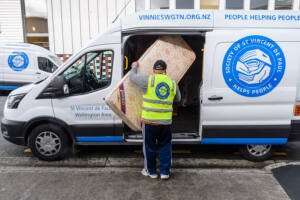
WelCom April 2024
Michael Fitzsimons
The St Vincent de Paul Society in New Zealand is in good heart with more than 100 active Conferences operating throughout the country.
According to its latest Annual Report, there are 22 Area Councils, 106 Conferences and 58 Vinnies Shops actively engaged in New Zealand.
The Report says that 2023 was a very challenging year for New Zealanders. A succession of natural disasters, culminating in Cyclone Gabrielle, devastated regions, communities and families. The Society launched a National Cyclone Appeal which raised $328,972 for affected communities. Local Vinnies Conferences have supported families and communities affected by floods and cyclones over the long haul.
In addition to natural disasters, a sharp rise in the cost of living and an economy still recovering from Covid-19 put immense pressure on vulnerable families. The result has been a marked increase in demand for Vinnies’ services in 2023, says the Report.
‘Our Conferences have been at the forefront of immediate relief efforts following the floods and cyclones. They have also been on hand to support struggling families with meals, food parcels, clothing, household goods and funds for health services and educational expenses when required. Providing companionship through home visits to the sick and elderly remains a regular St Vincent de Paul activity.’
The Society has 1,129 members and nearly 6,000 volunteers actively involved in its work.
Gerry Stevens, St Vincent de Paul Society President, said the Society is very well supported by people and communities at the local level.
‘I would like to thank all those people and businesses who donate so much food, goods, services and time to our work in local communities around New Zealand. Without them there would be much more need and sadness.’
Over the years the work of the Society has extended into new areas in response to the needs of the community. The Annual Report says current Strategic Initiatives include ‘working with like-minded organisations to extend our influence, providing community mental-health support, providing housing assistance and employment support, advocating for environmental care and sustainable living, and providing on-the-ground support for refugees, migrants and prisoners after their release.’